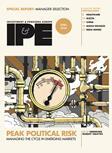Asset managers are concerned about the cost of incorporating environmental, social and governance (ESG) factors, according to a BNP Paribas Securities Services survey.
Asked about their views on barriers to deeper integration of ESG across their investment portfolios, 31% of asset managers cited costs as their biggest challenge over the next two years. It was also the single most important future barrier cited by all respondents, according to BNP Paribas.
The survey was of 461 respondents, with 233 asset managers and 228 asset owners participating. The largest share of respondents was based in the US.
The concern about rising costs was seemingly linked to the need for resources to deal with expected improvements in ESG data.
“As more and better ESG data become available, it is concern over increased costs – of data, process and investment talent – that will come to the fore,” said BNP Paribas. “This kind of uncertainty around the business model is giving industry participants pause for thought, and is acting as a brake on more widespread and rapid adoption.”
Over half of respondents said a lack of robust data was hindering greater adoption of ESG across their investment portfolios currently, with this being a particular concern for asset owners (64%). However, only 15% expected this to be a significant barrier in two years’ time.
Respondents expected a lack of advanced analytical tools and skills to be a bigger challenge by then, according to the survey. Almost a quarter of respondents said this would be a significant future barrier.
Analytics, said Jean-Philippe Hecquet, risk and performance analyst at BNP Paribas Securities Services, was about the ability to interpret and extract value from data, and would come to the forefront as the data challenge was overcome.
Trevor Allen, product specialist for investment risk and performance at BNP Paribas Securities Services, said: “That is where smart data, artificial intelligence, and ESG specialists will step in.
“We expect to see both managers and owners really ramping up their tech and personnel capabilities to address these needs in the coming years.”
Among other findings, the survey found that “frontline ESG practitioners”, such as ESG analysts and heads of responsible investment, were typically less confident about their organisations’ overall ESG capabilities than CIOs or CEOs. BNP Paribas noted that the sample of CEOs was small, however, counting 18 respondents.
Of the 20% of respondents who said they did not incorporate ESG in their investment decision-making/products, the main reason given was an inability to define ESG.
PRI – CFA Institute to tackle ‘important questions’
The Principles for Responsible Investment (PRI) is collaborating with the CFA Institute on a global study of ESG investing to “determine how widely ESG issues are used by mainstream investors”.
It is the first time that the PRI and the CFA Institute, the association of investment professionals, have worked together.
The PRI said that although ESG investing strategies have gained considerable ground over the past decade, for many investors it was not yet standard practice to consider ESG considerations across all asset classes.
The organisations said they hoped the collaboration would “determine the depth of the remaining barriers to ESG integration, particularly on the part of investment managers”.
Paul Smith, president and CEO of CFA Institute, said: “We look forward to working with this recognised leader on ESG matters.
“Our CFA Institute members and investors around the world are increasingly interested in getting answers to these important questions.”
The study will be based on information gleaned from workshops with groups of analysts and portfolio managers working on listed equities and fixed income. They will also be given a survey to complete about ESG integration.
More information about the study is available here.













No comments yet